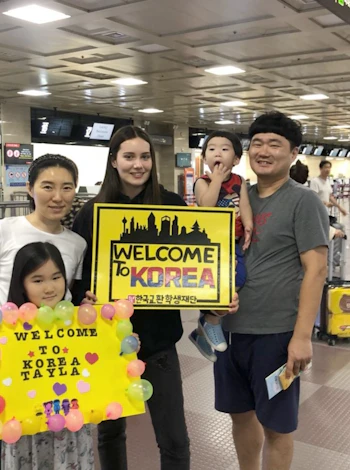High school exchange program
in South Korea
Immerse yourself in the South Korean culture and lifestyle, living with a host family and studying at a local high school.









Live like a local in the country of k-pop
Student exchange program in South Korea
Going on exchange to South Korea means immersing yourself in a vibrant, eclectic culture displaying a unique blend of modernity and tradition. The staples of South Korean society are based on Confucianism, harmony between individuals (especially within the family) and respect for elders. Bowing is the traditional greeting method in South Korea, and great importance is placed on friendship and tradition.
However, South Korea is not all Buddhist temples and rolling hills: it is also the country of fascinating metropolis, technology, K-pop and Noraebang (singing venues created to cater for one of the locals’ greatest passions: karaoke!).
Ready for a deep dive into all that South Korea has to offer?

South Korea: so much to discover
Cuisine
Korean cuisine is one of the most varied and delicious in the world. Rice and fresh vegetables are commonly used in traditional dishes such as 'kimchi' and 'bimbimbap', but more adventurous visitors might fancy trying 'Beondegi' (steamed slikworm pupae) on street markets...
What’s high school like in South Korea?
High standards
South Korea has traditionally placed great importance on education as a means for self-fulfillment and social advancement. Korea boasts one of the highest literacy rates in the world and the standard of their schools is quite high, with both private and public schools known to provide a great quality of teaching.
Hagwon
Hagwons are private after-school educational centres, extremely common in South Korea, that students often start attending from the age of five. After the school day is over (around 4:00 or 5:00 pm), local students head to their chosen Hagwon to receive additional tutoring, and later increase their chances to access a good university.
Student-teacher relationship
Korean teachers are afforded a great deal of respect and viewed as authority, almost parent-like figures. This can include displays of physical affection (hugging, patting, praising). Certainly an adjustment compared to western cultures!
Korean language
The official language is Korean, with different dialects depending on the region. South Korea has a unique phonetic alphabet with letters similar to the Latin alphabet. This makes the language easier to learn while also being connected to the unique characters!
A country full of wonders. Let it surprise you with an exchange experience!
Choose authenticity – trust WEP and prepare to be amazed.
On a WEP Classic program, you will experience the true essence of South Korean life. You may be placed anywhere in the country, depending on the location of the host family who chooses you to share this incredible adventure with.
Volunteer host family
Public school
Placement anywhere in South Korea
Short-term or semester programs available
Your host family during your exchange year
Gain a second family – they can’t wait to welcome you into their lives!
Here is why:
South Koreans are family-oriented and follow family traditions sincerely. Their values are rooted in Confucianism: adult children take care of their parents in old age and great importance is placed on living in harmony with each other.
South Korean families are loyal, loving, and caring. They have chosen to host you and make you a part of their family during your exchange program – Leave aside all expectations and prepare to be surprised by new family dynamics and ways of living!
You will slide into the routine of a South Korean family and share their daily life. Iconic celebrations, local specialties, unique places that most tourists don’t know about... thanks to your host family, it will all turn into reality.
Dinner time and weekends are a great time to be together. Try cooking something for your host family or find other ways to share your culture with them – they will appreciate it.


Your school in South Korea
Find out more about your Korean school experience
The school system in South Korea is composed of six years in primary school, three years in middle school, and three years in high school. Primary and middle school is compulsory for all children and usually free, in accordance with the principle of equal educational opportunity.
Secondary education, commencing when students are approximately 15 years old, is not compulsory. High schools can be public or private, but generally speaking, students are required to pay some admission and tuition fees.
The education system
Key subjects in high schools include Korean language, mathematics, English, Korean history, social studies, science, physical education,fine and practical arts.
Make the most of your program to explore new interests and choose electives such as technology, home economics, Chinese characters, another foreign language, moral education or liberal arts.
Subjects in South Korea
There are four types of high schools in South Korea:
- General High Schools – attended by the majority of South Koreans
- Special-Purposed High Schools – specialising, for example, in sports, science, arts, foreign languages...
- Vocational High Schools – specialised in preparing students to enter the workforce
- Autonomous High Schools – offering a slightly different curriculum aimed at preparing students to get into a top university and typically seen as elite institutions
Although the number of co-educational secondary schools has been on the rise, the majority of high schools in South Korea continue to be boys only or girls only.
Secondary schooling
High schools in South Korea don’t tend to offer many extra-curricular activities. Look for opportunities available in your area: sports or recreational centres, youth groups, a youth orchestra, art classes or volunteering opportunities. Your host family or coordinator will help you research what is available locally.
As school in South Korea is quite demanding, getting involved in new activities and past times outside of school will help you expand your networks and make friends outside of school.
Extra-curricular activities
The school year runs from March until February, with summer holidays in July-August and winter holidays in December-January. You will also experience several national holidays during your exchange – many of which are based on the Lunar Calendar:
- 1st of January: New Year's Day, many Koreans head to the coast or the mountains to watch the first sunrise of the year.
- end of January: Seollal, the Lunar New Year’s, people take time off to visit family, enjoying traditional food and playing traditional games.
- 1st of March: Independence Movement Day, commemorating the Declaration of Independence from Japanese colonisation.
- 5th of May: Children’s Day, a day full of special events for children and families.
- 8th day of the fourth lunar month: Buddha’s Birthday, lanterns appear on the streets leading to temples and solemn rituals take place.
- 6th of June: Memorial Day, with memorial services to honour the soldiers and civilians perished in war.
- 15th of August: Liberation Day, to celebrate the liberation of Korea at the end of World War II.
- 3rd of October: National Foundation Day, commemorating the legendary God-king Dangun founding the Korean nation.
- 15th day of the eight lunar month: Chuseok, a traditional holiday always seen as the Korean version of Thanksgiving Day.
- 9th of October: Hangeul Day, to remember the creation of the country’s native alphabet.
- 25th of December: Christmas Day, Christmas trees and lights can be seen all over the country.
The school calendar
The Korean school system is highly test-driven and focused on academic performance.
Academic grading varies from school to school, but it’s generally based on a 9-rank system, which considers the relative position or ranking of a student amongst all other students in the class. Ranks go from 1 to 9, with 1 being the highest and corresponding to an A+, 6 corresponding to a C (the minimum grade to maintain your average) and 9 being the lowest grade.
Grading system
Stories from students and parents who have been there
Here are the testimonials of families who have chosen WEP for their exchange experience.
Going with WEP is best
Since 1988, a wide choice of destinations and comprehensive assistance before, during and after your overseas program. WEP is the ideal partner for your big overseas adventure.
Like you, we also get to choose who we travel with: our schools, host families and overseas partner organisations are carefully selected.
We offer a custom-made insurance policy, specifically designed for our participants, and we have a solid network behind us.
Emergency assistance, overseas and from Australia, is available 7 days out of 7, 24 hours a day, 365 days a year.
Allowing all our participants to live their desired overseas experience is a mission, a challenge we're thrilled to accept.
FAQ
Your host family, local coordinator and your host organisation will provide you with support while you are overseas. WEP Australia will remain in contact with the host organisation and your parents to coordinate and support your experience. In case of an emergency, both you and your family will be able to call an emergency phone number that is answered 24/7.
You will be advised of your placement location, host family and host school as soon as feasible. This can range from a few months prior to departure, right up until departure, as a lot needs to happen behind the scenes before each student's placement process is complete and can be communicated to you with certainty. The placement process doesn't only include sourcing a suitable host family, but also finding availability at a local school, and completing all red tape (including, for example, lenghty criminal history checks in some countries). Prior to departure from Australia, all students will receive host family, host school and local coordinator details.
Independent travel is not permissible while on exchange. However, you will be able to travel with your host family, school, host organisation and other community groups such as sporting teams or scouts. Again, the foremost aim of the program is educational, and your priority for any holiday periods must be your host family, who will be investing a lot of time, energy and money into this experience - simply in return for your frienship and positive contribution to their household.
Generally speaking, overseas schools won't issue a diploma to exchange students who are only there for a short time and don't graduate at that school. You may however be provided with a honorary certificate, as well as a WEP certificate of completion, which however don't count towards credit or graduation in Australia.
Language experience is desirable, but not necessary, for most countries. However, some countries have mandatory language requirements. You'll find the specific requirements for each country listed on its page. Intensive language courses may, in some circumstances, meet language pre-requisites. WEP strongly recommends language preparation prior to departure as language knowledge is of enormous benefit in assisting you to quickly adapt to your new family, school and life.
Of course, there are English-speaking destinations available if you are not interested in learning another language.
No, it's the host families who choose the student they wish to invite into their home. Based on the documents you will submit as part of your WEP application, one lucky family will choose to open their home and hearts to you, which is why for all Exchange Classic programs, and many Flex programs as well, there is no avenue for students to choose a specific location.
It may be possible to live with an overseas family that you already know (excluding relatives of the student). However, the family will have to be screened and approved, prepared and supported by our partner organisation in the same manner as any other host family. School enrolment must also be available.
More questions?

